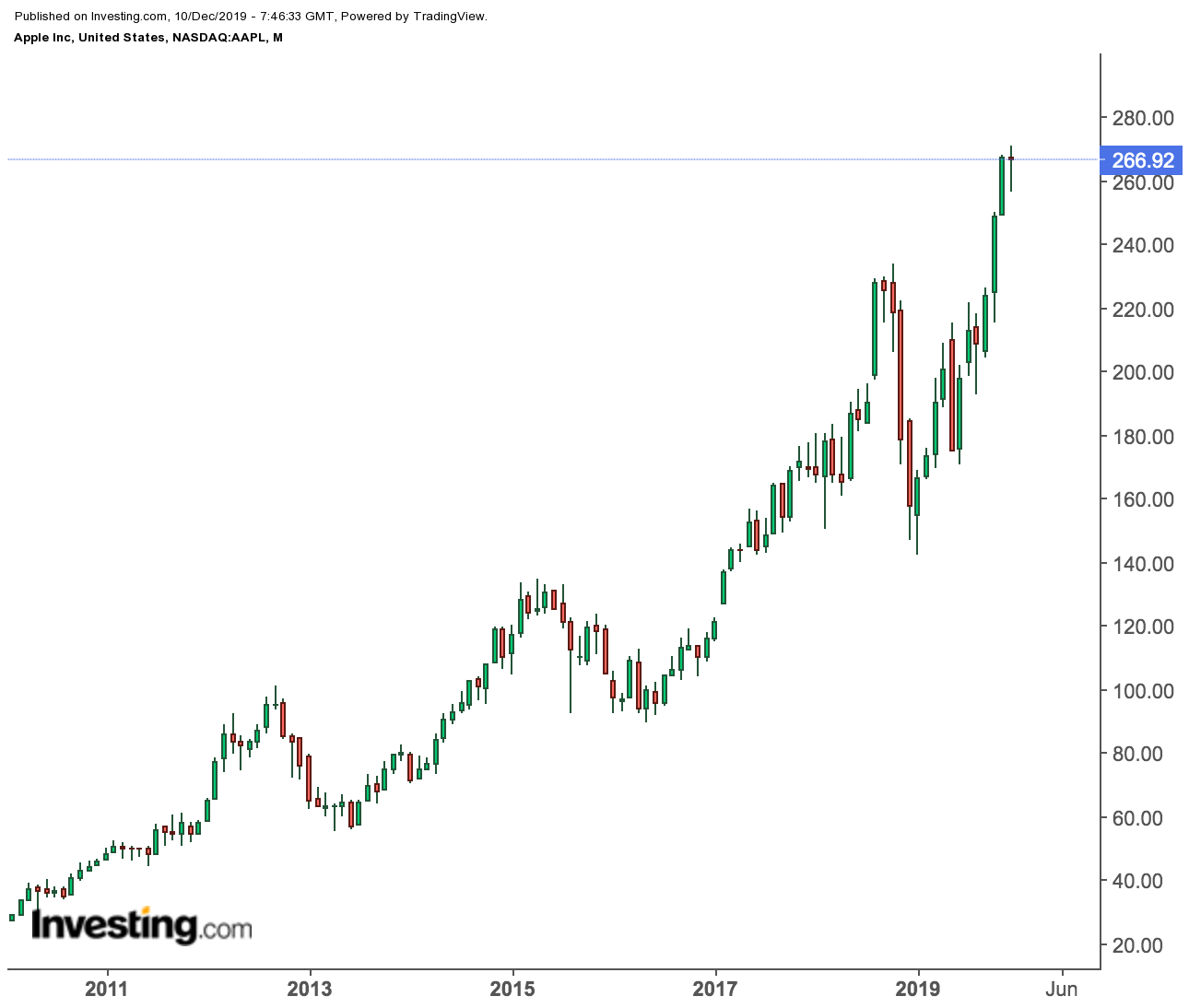Here's Why Apple’s 70% Rally In 2019 Will Survive Into The New Year
Investing.com | Dec 10, 2019 05:24
As 2019 is about to slip into history, this is a good time to look back and analyze which of the year’s calls proved right —and profitable — and which turned out to be wrong.
In the group of high-growth technology stocks known as FAANGs, Apple (NASDAQ:AAPL) is one stock that surprised many analysts with its strong momentum, as it defied all doomsday scenarios. It's worth taking a deeper look to see if this trend will continue as we head into 2020.
For Apple, 2019 was an extremely unsettling year as it faced slowing demand for its flagship iPhones, while the macro environment turned hostile after the U.S. and China became embroiled in a long trade war. With 20% of the company's sales coming from China, where it has also developed a huge network of suppliers, Apple faced a direct threat to its business from the prospect of rising tariffs and tit-for-tat retaliations.
Apple, still the largest and most profitable technology company in the world, started the new year with its stock price down more than 30% from the record high it hit in August of 2018. As 2019 progressed, however, it became clear that the consumer tech giant had plenty of ammunition to deal with the challenging situation the trade dispute created.

In our March 27 analysis, we strongly recommended buying Apple stock on this weakness since, in our view, the company’s push to expand its services business would be successful as the company evolved away from just being about iPhones.
While shares closed yesterday down 1.4% at $266.92, they have gained more than 40% since March. And the stock is up more than 70% this year, outperforming FAANG peers, which includes Facebook (NASDAQ:FB), Amazon.com (NASDAQ:AMZN) and Netflix (NASDAQ:NFLX).
Fueling these hefty gains is strong interest in the company’s iPhone 11 and investor optimism that China policy won’t hurt Apple even if the current trade spat continues, because of the company's massive contribution to the Chinese economy.
5G Phones Will Be New Growth Driver
In a note to clients this summer, Bank of America analyst Wamsi Mohan gave a low probability to a scenario where Apple gets caught up in the U.S.-China crossfire. With the China risks being re-evaluated, investors are again focusing on the company’s strong product pipeline and its push to accelerate sales through its services division.
One new driver which will increase the demand for new hardware is the roll-out of fifth generation, or 5G, phones in 2020. Wall Street analysts expect the company to return to iPhone revenue growth in the fiscal year ending in September 2021. Wall Street’s estimates for the impact of 5G iPhones on Apple are too conservative, according to Jefferies analyst Kyle McNealy.
The latest bullish trend in the stock is also reflecting CEO Tim Cook’s success in diversifying Apple’s revenue away from iPhones. The company’s services, which include Apple Music, movie rentals and app downloads, produced 33% growth last year with sales touching $40 billion—accounting for about 15% of the company’s total revenue of $265.6 billion.
So far this year, that trend continues. In the fourth-quarter, sales in its services business rose 18%, while sales in its wearables business soared 54% on the popularity of its AirPods wireless earbuds. The company is expanding on its entertainment push with the recent launch of the new Apple TV+ streaming service.
That contribution will continue to grow once the company’s new line of services — video-streaming, Apple Pay and gaming — start to chip in. According to an estimate by Morgan Stanley, the services contribution will continue to expand and could generate about 60% of Apple’s revenue in the next five years.
Bottom Line
Apple’s current move higher is backed by real improvements in fundamentals and some re-pricing of the risk that analysts had associated with the U.S.-China trade war. We continue to recommend Apple shares for long-term investors who want to have a solid tech name in their portfolio.
Trading in financial instruments and/or cryptocurrencies involves high risks including the risk of losing some, or all, of your investment amount, and may not be suitable for all investors. Prices of cryptocurrencies are extremely volatile and may be affected by external factors such as financial, regulatory or political events. Trading on margin increases the financial risks.
Before deciding to trade in financial instrument or cryptocurrencies you should be fully informed of the risks and costs associated with trading the financial markets, carefully consider your investment objectives, level of experience, and risk appetite, and seek professional advice where needed.
Fusion Media would like to remind you that the data contained in this website is not necessarily real-time nor accurate. The data and prices on the website are not necessarily provided by any market or exchange, but may be provided by market makers, and so prices may not be accurate and may differ from the actual price at any given market, meaning prices are indicative and not appropriate for trading purposes. Fusion Media and any provider of the data contained in this website will not accept liability for any loss or damage as a result of your trading, or your reliance on the information contained within this website.
It is prohibited to use, store, reproduce, display, modify, transmit or distribute the data contained in this website without the explicit prior written permission of Fusion Media and/or the data provider. All intellectual property rights are reserved by the providers and/or the exchange providing the data contained in this website.
Fusion Media may be compensated by the advertisers that appear on the website, based on your interaction with the advertisements or advertisers.